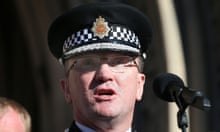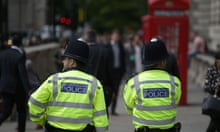Officers investigating a suspicious package sent to the University of Glasgow on Wednesday believe it is linked to the three explosive devices sent to London transport hubs on Tuesday.
Police Scotland said officers investigating the Glasgow parcel “have now linked the incident with a similar investigation being carried out by the Metropolitan police service”.
They added: “Officers from both investigation teams are now working together closely to share any information or intelligence that could assist their respective inquiries.”
Commander Clarke Jarrett, from the Met’s counter-terrorism command, said: “Due to similarities in the package, its markings and the type of device that was recovered in Glasgow, we are treating it as being linked to the three packages we’re investigating in London. We are working very closely with our colleagues from Police Scotland and both investigations are being run in tandem.
“We continue to pursue a number of lines of inquiry and one such line is the possibility that the packages have come from Ireland. However, we are still keeping an open mind with regards who may be responsible and any possible motivation.”
He added: “We have issued extensive advice to transport hubs and mail sorting companies to be vigilant for and report suspicious packages to police. Following today’s developments in Glasgow we have extended this advice … reiterating it to those in the education sector.”
Buildings at Glasgow University were evacuated after the suspicious item was found in the main campus mailroom. Police Scotland said there was no further threat to the public after a bomb disposal unit dealt with the device.
Steve Johnson, an assistant chief constable of Police Scotland, tweeted: “The [Glasgow] package was not opened and no one was injured. The emergency services were alerted and several buildings within the estate were evacuated as a precaution. A controlled explosion of the device was carried out this afternoon by EOD [explosive ordnance disposal].”
Police also cordoned off parts of the University of Essex on Wednesday and evacuated some buildings after being alerted to a suspect package, but Essex police said that, after investigation, it had posed no risk.
Royal Bank of Scotland offices in Edinburgh were also evacuated on Wednesday due to a suspect parcel, but this turned out to contain only promotional material.
The developments came on a day of heightened caution, with postal sorting offices and transport hubs on high alert for more explosive packages after homemade devices were found in the post room at London Waterloo station, City Aviation House at London City airport and the Compass Centre close to the grounds of Heathrow airport.
All three packages had stamps from the Irish Republic and had Dublin as the return address.
The stamps were issued by Ireland’s post office to mark Valentine’s Day and bore pink hearts, with the explosive devices stuffed into A4-size yellow Jiffy bags stuffed inside white postal bags.
Investigators said they believed the devices had not been designed to kill but they were not yet sure enough to say if they had been the work of dissident Irish republicans who do not accept the peace process.
The Met’s deputy assistant commissioner Dean Haydon, senior national coordinator for counter-terrorism policing, urged vigilance in case there were more devices.
“They were sent through the postal system, so we are not ruling that out,” he said.
“We’ve only seen three, but, as a result, we’ve sent our detective security messaging across the country to key places and locations that have sorting offices with a view to identify if there are more and then, hopefully, we can intercept them at an early stage. But there’s no indication there’s any more.”








